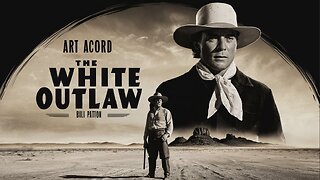Premium Only Content

AS YOU LIKE IT (1936) Elisabeth Bergner & Laurence Olivier | Drama, Comedy, Romance | B&W
As You Like It is a 1936 British romantic comedy film directed by Paul Czinner and starring Laurence Olivier as Orlando and Elisabeth Bergner as Rosalind. It is based on William Shakespeare's play of the same name. It was Olivier's first performance of Shakespeare on screen.
It was the final film of stage actors Leon Quartermaine and Henry Ainley, and featured an early screen role for Ainley's son Richard as Sylvius, as well as for John Laurie, who played Orlando's brother Oliver. (Laurie would go on to co-star with Olivier in the three Shakespearean films that Olivier directed.)
Bergner had previously played the role of Rosalind in her native Germany and her German accent is apparent in most of her scenes.
SYNOPSIS
A Duke usurps his brother's land and power, banishing him and his entourage into the forest of Arden. The banished Duke's daughter, Rosalind, remains with her cousin Celia. She has fallen in love with Orlando, but he has his own tyrannical brother with whom to contend, so he joins those in the forest. Rosalind, now banished, disguises herself as a young man, with Celia as her servant, and follows Orlando into the forest. There, nature stirs love's fires in various rustics as well as in those from the court. Phebe, a shepherdess loved by Silvius, is smitten with the disguised Rosalind. Can true love find a way, and can brothers be reconciled and harmony restored?
Duke Frederick (Felix Aylmer) has usurped and deposed his older brother, Duke Senior (Henry Ainley). Frederick allows the exiled Duke's daughter, Rosalind (Elisabeth Bergner), however, to stay, as she is the closest friend of his daughter, Celia (Sophie Stewart). Orlando (Laurence Olivier), who has been forced to flee his home due to the oppression from his brother, Oliver (John Laurie), comes to the Frederick's Duchy, and enters a wrestling tournament. On leaving the Duchy, Orlando encounters Rosalind, and it is love at first sight. Frederick then becomes angry, and banishes Rosalind. Celia decides to accompany her, along with a jester, Touchstone (Mackenzie Ward).
Rosalind and Celia disguise themselves as "Ganymede", a boy, and "Aliena", respectively, and venture into the Forest of Arden, where they eventually encounter the exiled Duke. Orlando, deeply in love, posts love poems on the trees in praise of Rosalind. Orlando comes across Ganymede, who tells him he can teach Orlando how to cure love by pretending to be Rosalind. At the same time, Phoebe (Joan White), a shepherdess, falls in love with Ganymede, though he (she) continually rejects her. Sylvius (Richard Ainley), a shepherd, is in love with Phoebe, which complicates the matter. Meanwhile, Touchstone attempts to marry the simple farmgirl, Audrey (Dorice Fordred), before he can be stopped by Jaques (Leon Quartermaine), a Lord who lives with the exiled Duke.
CAST & CREW
Elisabeth Bergner as Rosalind.
Laurence Olivier as Orlando.
Sophie Stewart as Celia.
Henry Ainley as Duke Senior
Leon Quartermaine as Jaques.
Felix Aylmer as Duke Frederick
Directed by Paul Czinner
Written by J. M. Barrie (treatment), R. J. Cullen (scenario)
Based on As You Like It (play) by William Shakespeare
Produced by Paul Czinner
Cinematography Harold Rosson
Edited by David Lean
Music by William Walton
Distributed by 20th Century Fox
Release date 3 September 1936 (United Kingdom)
Running time 96 minutes
Country United Kingdom
Language English
Budget £180,000
NOTES
The 1936 adaptation was directed in London by Paul Czinner, an Austrian Jew who fled his home country to avoid political persecution. The film stars his wife, Elizabeth Bergner, also an Austrian Jewish refugee. To the persecuted, the escape to the Forest of Arden does not simply represent, as Celia sees it, a place to spend time and relax so much as an escape to freedom. This view is reflected in the film created by refugees, and speaks to other refugees and exiles.
The film is notable for being scored by William Walton, who was to become Olivier's longtime musical collaborator, scoring his films of Henry V, Hamlet and Richard III, and defending his score for the film Battle of Britain against its replacement by Ron Goodwin's.
Writing for The Spectator in 1936, Graham Greene gave the film a mixed review. When considering the film as a work of Shakespeare, Greene noted that the film maintained a relatively high level of faithfulness to the original play despite the British Board of Film Censors' disapprobation of anything remotely approaching immodesty. Greene praised the acting of Bergner and Olivier, although he expressed dissatisfaction with that of Ainley and Quartermaine. When considering the film as a cinematic experience, Greene found it to be "less satisfactory". Criticizing Czinner for treating the medium as little more than a larger stage with "far too many dull middle-length shots from a fixed camera", Greene suggested that the presentation of the story was disappointing.
-
 56:59
56:59
Lost n Found Films
2 hours agoTHE WHITE OUTLAW (1929) Art Acord, Bill Patton & Lew Meehan | Western | BW | Free Movie
14 -

TimcastIRL
2 hours agoDemocrats LOSE IT Over SECOND Liberal Judge ARRESTED By Trump Admin | Timcast IRL
124K65 -
 LIVE
LIVE
Man in America
17 hours agoEXPOSED: Trump's COVERT War Against the European Banking Cartel w/ Tom Luongo
1,284 watching -
 1:45:48
1:45:48
Glenn Greenwald
6 hours agoGlenn Reacts to News of the Week; Plus: Audience Q&A | SYSTEM UPDATE #443
57.6K40 -
 LIVE
LIVE
Dr Disrespect
11 hours ago🔴LIVE - DR DISRESPECT - PUBG - 5 CHICKEN DINNERS CHALLENGE
3,808 watching -
 LIVE
LIVE
I_Came_With_Fire_Podcast
10 hours agoSHALL NOT BE INFRINGED| THE TYRANNY OF UNELECTED BUREAUCRATS | XI BOWS
161 watching -
 LIVE
LIVE
SynthTrax & DJ Cheezus Livestreams
12 hours agoFriday Night Synthwave 80s 90s Electronica and more DJ MIX Livestream THE GREAT EDO WARS OF 2067 Edition
320 watching -
 LIVE
LIVE
RalliedLIVE
2 hours ago $0.45 earnedWarzone Domination w/ Ral
173 watching -
 1:10:17
1:10:17
Sarah Westall
4 hours agoWorld Leaders Increasingly Display Panic Behavior as Economic Change Accelerates w/ Andy Schectman
34.5K5 -
 LIVE
LIVE
Motherland Casino
1 hour agoScar x Ayanna
69 watching